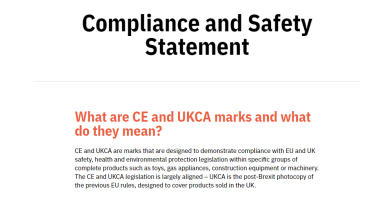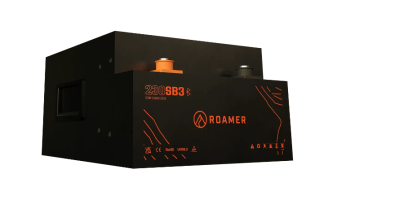check out the certifications:

+++
What are CE and UKCA marks and what do they mean? CE and UKCA are marks that are designed to demonstrate compliance with EU and UK safety, health and environmental protection legislation within specific groups of complete products such as toys, gas appliances, construction equipment or...

roamer.com
+++
Compliance and Safety Statement
What are CE and UKCA marks and what do they mean?
CE and UKCA are marks that are designed to demonstrate compliance with EU and UK safety, health and environmental protection legislation within specific groups of complete products such as toys, gas appliances, construction equipment or machinery. The CE and UKCA legislation is largely aligned – UKCA is the post-Brexit photocopy of the previous EU rules, designed to cover products sold in the UK.
Are CE or UKCA certificates legally required?
Lithium cells, batteries and packs do not need any CE marking or certificates as they do not fall into one of the specific product groups listed.
If they’re not legally required, why do Roamer use CE and UKCA marks?
While stand-alone lithium batteries and cells do not require CE marking, electronic products that contain lithium batteries might be covered by one or more CE directives such as the EMC Directive, the RoHS Directive, or the Radio Equipment Regulations 2017. Due to the inclusion of Bluetooth functionality, Roamer batteries are in scope of the EU Radio Equipment Regulations 2017 and equivalent UK Radio Equipment Regulations, which require the use of the CE and UKCA marks respectively.
Does your testing cover every Roamer battery model?
Passive components and products (like cells and casing etc) do not radiate any electromagnetic radiation, and are not required to undergo the tests. A test on one specific battery model is therefore sufficient to meet regulations for all other battery models in that range, providing it uses the same Bluetooth module and BMS type.
What other legislation and standards apply?
GPSD
Products that are not covered by the UKCA or European CE marking directives may still fall within the scope of other national legislation (for example special standards for the automotive industry). Or, if there is no specific legislation, the General Product Safety Directive (2001/95/EC) may apply. This European Directives requires that products are safe but does not require specific certification.
RoHS
The Restriction of Hazardous Substances Directive 2002/95/EC sets limits for certain hazardous substances in electrical and electronic equipment. Notice that lithium batteries are not covered under the RoHS Directive, and the restricted level of hazardous substances such as mercury, and cadmium, shall comply with the Battery Directive instead. The RoHS test certificate commissioned by Roamer covers the additional parts such as cables, casing and glue.
Battery Directive
The Battery Directive covers lithium batteries and other types of batteries manufactured, imported, and sold in the EU market. Similar to the RoHS Directive, it sets limits for the amount of certain heavy metals. It also covers labelling requirements. LiFePO4 batteries do not contain Lead, Mercury or Cadmium so this is a simple one to comply with.
EN 62619
EN standards are widely used to improve the product’s safety and performance. They provide specific test methods and procedures to help importers and manufacturers to reach these goals. Following EN standards is generally not mandatory but highly recommended. We use branded cells from very large manufacturers and have lab test reports to verify battery safety and demonstrate compliance, including drop tests and puncture tests.
UN38.3 and UN3480
The International Air Transport Association (IATA) notes that compliance with the requirements in UN 38.3 is mandatory to safely transport lithium batteries by air. The ADR is the European Agreement concerning the international carriage of dangerous goods by road and also require lithium batteries to meet requirements of UN38.3.
In order to ship Roamer batteries by air and road, we have had to go through long and arduous processes with our couriers to demonstrate safety and compliance. After meeting the courier requirements to ship Dangerous Goods, UN3480 now simply determines the labelling we apply to the packaging and the state of charge of the battery when shipping (we don’t ship fully charged for this reason).
What else do you do to demonstrate safety?
We voluntarily test every battery before it leaves the factory by cycling to 100% and 0% and applying a high charge and discharge load. This helps us identify potentially faulty cells and connections, test BMS performance and verify cell balance at the top and bottom of the voltage-charge cycle.
How can I ensure the battery is safe after installation?
While LiFePO4 is recognised as the safest form of lithium battery, there is always a risk of fire with any battery that stores large amounts of energy. While the Roamer BMS will prevent damage due to a wide range of external factors such as overcharging and extreme temperatures but BMS protections should be seen as the last line of defence rather than the first. It is important that installation, charging and storage is carried out to manufacturer guidelines so that the BMS is only called into action when other protections fail. We also recommend you take additional precautions such as fitting a smoke and heat detector close to where batteries are located. If you have any concerns or questions regarding safe installation and maintenance, please get in touch with us.

 www.t6forum.com
www.t6forum.com




